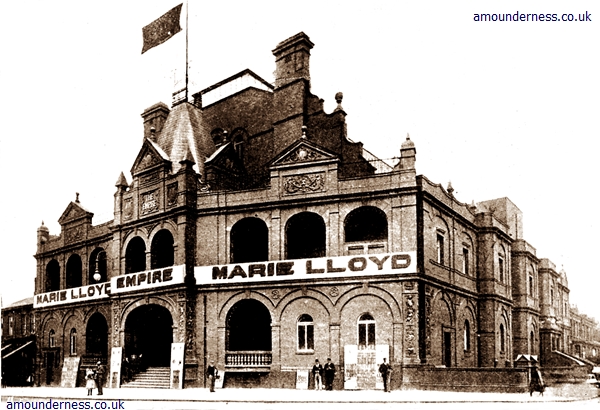|
Newspaper article relating to the opening of the Empire Theatre,
Blackpool
The Era, Saturday, 13th July,
1895.
THE EMPIRE THEATRE, BLACKPOOL.
The
new Empire Theatre of Varieties, the latest addition to Blackpool's numerous places
of entertainment, was opened on the 4th inst. In response to the invitation of the
management, there was a large and fashionable gathering. Madame Levanti's Bohemian
ladies' orchestra played the National Anthem, Miss Florence Fish singing the solo,
the audience meanwhile standing. The orchestra then played a sprightly march,
appropriately named "Our Empire,' after which Mr Cookson, the manager, who was
enthusiastically received, stepped to the front and gracetully acknowledged the
compliment the audience had paid the directorate in so handsomely responding to the
invitations issued. With a passing request that any little imperfections in the
performance caused by the hurried nature of the arrangements might be overlooked,
"the genial Charlie" expressed the hope that the entertainment would be worthy of
their appreciation, and that the place would gain a high
reputation.
Excellent turns were contributed by Miss Maggie Duggan, whose
male impersonations were very suer cessful ; Mr Quinton Gibson, one of the best
'female impersonators of the present day ; Mr Lester Barrett, humourist; Mr John
Renson and Miss Rose Waite, song and dance artists ; Miss. Lottie Collard, Mr Dick
Gehlard, Miss Marie Stuart, and soloists from the ladies orchestra. A ball
followed.
 The building occupies a commanding
position at the top of Church-street, and is in the centre of the town. It has
been built by Messrs Peters, of Rochdale, from the designs of Mr J. D. Harker,
A.R.I.B.A., of Manchester, at a cost of about £30,000. The building occupies a commanding
position at the top of Church-street, and is in the centre of the town. It has
been built by Messrs Peters, of Rochdale, from the designs of Mr J. D. Harker,
A.R.I.B.A., of Manchester, at a cost of about £30,000.
The
interior has been tastefully decorated in the Italian Renaissance style by Mr R.
Bennett, of Manchester, and the elaborate decorative work of the proscenium and
balconies has been executed by the London Plastic Decorative and Papier Mache
Company (Limited).
The
proscenium is very fine, being 32ft. wide and 25ft. high. Mr T. E. Ryan, of London,
has painted a very pretty act-drop, and the other scenery is by Mr H. Lemaistre. of
the Manchester Theatre Royal. The stage appointments are excellent, and special
provision has been made for the comfort of artists, the dressing-rooms being fitted
with hot and cold water, the latter being heated by electricity, and there is an
ingenious contrivance for heating curling tongs. The stage is separated from the
auditorium by an asbestos fire-proof curtain, made by Messrs Tollerton, of Leeds ;
and Messrs Lowcock and Co., of Manchester, have installed the electric
light.
The
company's original intention was to provide dancing and variety entertainments for
thousands of holiday makers who go to Blackpool every summer, but the refusal of
the magistrates to grant them a singing and dancing licence will cause the
directors to alter their plans. Application for a dramatic licence, however, was
made to the Town Council, and the Watch Committee recommended that it should he
granted.
The subject came before
the Town Council on the 2d inst., when Mr Councillor Sergenson (the manager of the
Grand Theatre and lessee of the Prince of Wales's Theatre) objected to the licence
being granted, and protested against the way in which the Watch Committee had come
to their decision. He said he did not object in any personal or partial spirit, but
when he wanted to open his new theatre at a certain date and made application for a
licence, it was deferred on the ground that the building was not reads-. He thought
it was his duty to protect himself as far as possible, and it was a question
whether they were not overdoing these entertainments in Blackpool. The Empire
people had applied to the magistrates for a music, dancing, and singing licence,
but it was refused, though the place was built for singing and dancing, and as a
music hall.
Then they applied for a
dramatic licence, for which they had no use, as he was informed that not a single
dramatic company was engaged. The entertainments, he maintained, would be largely,
if not altogether, of a music hall character. A dramatic licence was not necessary
for a music hall, and the proper place to apply for a licence was before the
magistrates.
It
was for one purpose only, that of drinking, that the application was made. Mr
Councillor Ward said the application for a dramatic licence was made over a month
ago, and before the refusal of the magistrates to grant a music and dancing
licence. The matter had only been deferred by the Watch Committee until the
building was more complete, and certain provisions had been made. The Committee
were now prepared to treat the applicants as they did other places of entertainment
in the town.
Mr
Alderman Buckley was astounded at the attitude taken up by Mr Councillor Sergenson,
who was chairman of the Advertising Committee, which spent £1,700 a-year in trying
to induce people to visit Blackpool, but who was now declaring that they were
overdoing the town with amusements. Mr Councillor Sergenson asked the Town Clerk if
a dramatic licence carried with it power to permit dancing. The Town Clerk
expressed the opinion that it did not. Mr Councillor Sergenson--Not without making
a special appeal to the magistrates The Town Clerk—No, but they could appeal to the
Queen's Bench. Eventually the recommendation of the Committee was carried, and the
licence granted.
|